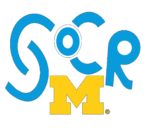Difference between revisions of "SOCR News MIWI SummerSchool 2020"
(→References) |
(→Logistics) |
||
| Line 7: | Line 7: | ||
* [https://sph.umich.edu/mental-physical-health-training/MIWI Website: https://sph.umich.edu/mental-physical-health-training] | * [https://sph.umich.edu/mental-physical-health-training/MIWI Website: https://sph.umich.edu/mental-physical-health-training] | ||
* '''Application''': [https://gremap.org/2020/01/13/miwi-michigan-integrative-well-being-and-inequality-training-program-application-open/ MIWI Application Process] | * '''Application''': [https://gremap.org/2020/01/13/miwi-michigan-integrative-well-being-and-inequality-training-program-application-open/ MIWI Application Process] | ||
| − | * ''' | + | * '''Dates''': June 22-26, 2020 |
| − | * '''Place/Time''': | + | * '''Place/Time''': Thu, June 25, 2020, 10:00-11:30 AM (details coming up ...) |
* '''Session''': ''The Interface between Data Science and Health Analytics'' | * '''Session''': ''The Interface between Data Science and Health Analytics'' | ||
* '''MIWI Mentor/Presenter''': [http://umich.edu/~dinov Ivo Dinov] | * '''MIWI Mentor/Presenter''': [http://umich.edu/~dinov Ivo Dinov] | ||
Revision as of 14:37, 5 May 2020
Contents
SOCR News & Events: Michigan Integrative Well-Being and Inequality (MIWI) Summer School
The Michigan Integrative Well-Being and Inequality (MIWI) Training Program is an interdisciplinary methods training program that prepares participating scholars to investigate the intersection of mental and physical health, with an emphasis on how this intersection relates to health disparities. The training encompasses conceptual frameworks, study designs, data collection needs, and analytic approaches necessary to conduct this innovative research. The program includes an intensive 4-day summer school, in Ann Arbor, MI, followed by ongoing collaboration with a mentorship team.
Logistics
- Website: https://sph.umich.edu/mental-physical-health-training
- Application: MIWI Application Process
- Dates: June 22-26, 2020
- Place/Time: Thu, June 25, 2020, 10:00-11:30 AM (details coming up ...)
- Session: The Interface between Data Science and Health Analytics
- MIWI Mentor/Presenter: Ivo Dinov
Objectives
- Offer a number of "open-science" resources for data science and predictive health analytics
- Gain knowledge about some qualitative (e.g., exploratory data analysis) and quantitative (e.g., AI/ML) methods for interrogating large and complex biomedical datasets and health case-studies
- Hands-on experience with using some of the tools and web-services; bring your own data (BYOD)
- Provide consultation and team-science approach to tackling difficult data-driven challenges
Format
- Prior to session, all trainees need to
- Draft a top-3 list of problems they are facing or expect to face in the next 12-months (these should be specific, tangible, and pragmatic)
- Select 1-2 datasets that they may be interested in experimenting with during the Summer School and during this Session. The data can be in any format, however, if a specialized format is used, we need to be able to translate the data into a common data format.
- During the Morning session, we will review a number of free/open-access web resources.
- In the Afternoon session, teams of trainees will be exploring hands-on some of their data using the available tools and services. The mentor will provide feedback and consultation, as needed.
- Each team/participant will be asked to submit a brief 2-page report illustrating (1) some challenges, (2) describing the test data they used, (3) illustrating some of the results, and (4) reflect on their experience and findings.
Discussion Topics
- Data Science & Predictive Analytics (DSPA) Skills (10-min)
- Overview of SOCR capabilities, resources, and expertise (10-min)
- Hands-on Practice, Try-It-Now, apply to new data (20-min)
- Suggestions, comments, questions, critiques, etc. (10-min)
- Participants should bring laptops, and datasets, to try some of the hands-on resources before, during, and after the training workshop
- URL: http://wiki.socr.umich.edu/index.php/SOCR_News_MIWI_SummerSchool_2020
Background
- SOCR News & Events
- SOCR Global Users
- SOCR Navigators
- SOCR Datasets and Challenging Case-studies
- Electronic Textbooks:
Demos
- General SOCR Webapps
- SOCR BrainViewer
- Motion Charts webapp (try it with your own high-dimensional longitudinal data, e.g., Ozone Data)
- Hands-on interactive visualization of extremely high-dimensional data (learning module and webapp)
- Predicting Hospitalization-based Pressure Injuries (webapp)
- Virtual Hospital and Simulated Patient EHR Data (webapp)
References
- This breakout section is sponsored in part by NIH Grants P30 DK089503, P20 NR015331, R01CA233487, and R01MH121079, as well as, NSF Grants 1916425, 1734853 and 1636840.
- SOCR Home page: http://www.socr.umich.edu
Translate this page:
